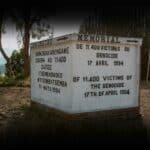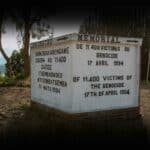The United Nations (U.N.) has designated the Day of Remembrance of the Victims of the Rwanda Genocide to be observed on April 7. This day recalls the deaths of almost 800,000 individuals who were killed during the 1994 genocide in Rwanda. And about 2,000,000 people were displaced as homes were razed to the ground. It is a time to mourn the dead, support the survivors, and work together to guarantee such a catastrophe never happens again in Rwanda, Africa, or anywhere else for that matter.
History of Day of Remembrance of the Victims of the Rwanda Genocide
When the Rwandan genocide began in 1994 during the Rwanda Civil War, it was part of a larger campaign of ethnic cleansing against Tutsis in Rwanda. The country consisted of three ethnic groups; the Hutu (about 85% of the population), the Tutsi (14%), and the Twa (1%). During the 100 days from April 7 to mid-July 1994, members of the Hutu majority administration aimed to murder the Tutsi minority and anybody who protested the aims of genocide. A total of more than 800,000 civilians — mainly Tutsis — were believed to have been slain. In addition, 30% of the Pygmy Batwa, the indigenous residents, were killed during the battle.The slaughter began when a plane transporting then-President Juvénal Habyarimana and Burundi’s President, both Hutus, was shot down. The Rwandan Patriotic Front (RPF), whose members were mostly Tutsis, was suspected of carrying out the shooting. Hutu radicals refused to accept this and launched a vengeance campaign. However, a Tutsi-backed and fully armed Rwandan Patriotic Front (RPF) led by Paul Kagame gained control of the capital and most of the country, effectively bringing the genocide and indiscriminate slaughtering of Rwandans to a stop. The Rwandan government estimates that over 2,000,000 people, predominantly Hutus, were displaced and became refugees.The U.N. declared April 7 as the International Day of Remembrance for the Victims of the Rwanda Genocide. The first observance fell in 2004, 10 years after the genocide tragedy. In 2018, Rwanda’s Permanent Representative to the U.N. suggested renaming the day the International Day of Reflection on Rwanda’s 1994 Genocide Against the Tutsi.
Day of Remembrance of the Victims of the Rwanda Genocide timeline
Rwandan President Juvénal Habyarimana's jet is shot down over Kigali airport on April 6, triggering the massacre.
The U.N. General Assembly declares April 7 as the Remembrance Day of the 1994 Rwandan Genocide.
The first remembrance is held 10 years after the genocide.
The day is renamed International Day of Reflection on the 1994 Genocide Against the Tutsi in Rwanda.
Day of Remembrance of the Victims of the Rwanda Genocide FAQs
Who is accountable for the genocide in Rwanda?
The accountable ones are the perpetrators. They are the Hutu-led government, Hutu militia groups, and other militias and groups backed by civilian Félicien Kabuga Hutu extremists.
What human rights were violated during the Rwandan genocide?
The violations included the rights to a fair trial and freedom of expression and privacy. There were also enforced abductions, torture claims, and excessive force.
Who are Tutsi people?
The Tutsi people live in Rwanda, Burundi, and the Democratic Republic of the Congo’s northeastern region. They share many traits with the Twa and Hutu tribes, and their languages and cultures are also similar. The Tutsi used to be livestock herders.
How to Observe Day of Remembrance of the Victims of the Rwanda Genocide
-
Watch a documentary
Watch a documentary and learn about the Rwandan genocide by educating yourself on the subject. You will gain a better understanding of the history of the genocide and the impact it had on the Rwandan people.
-
Share on social media
You can educate yourself and those in your immediate vicinity on the Rwandan genocide and other related topics. You can also share what you learn with your friends by posting it on social media or giving presentations to them to exchange your knowledge.
-
Talk to Rwandans
You can speak with the survivors' descendants to learn more about how the genocide affected them and their families. You can also hear from those who lived through the battle about their personal experiences with the genocide.
5 Important Facts About The Rwandan Genocide
-
Official U.N. observance
A public holiday is not observed in Rwanda on this day, as it is an official U.N. commemoration of the victims of the 1994 genocide.
-
It was ethnically driven
Not only were Tutsis systemically murdered, but anyone who opposed the massacre was also targeted, including moderate Hutus.
-
Commemoration in Rwanda
This day is observed as Genocide Memorial Day in Rwanda under the name 'Kwibuka,' which means 'to remember.'
-
Mourning period
The Genocide Memorial Day in Rwanda marks the beginning of the national mourning period that lasts until July 4, Liberation Day.
-
Moment of Silence
Thousands of people from all over the world participate in memorial rituals that involve candle lighting and a moment of silence to remember those who died during the Rwandan genocide.
Why Day of Remembrance of the Victims of the Rwanda Genocide is Important
-
It encourages people to speak up
The day raises awareness of the genocide that occurred. Additionally, it gives the Tutsi people a voice and a way to process and discuss the genocide.
-
It gives empathy to those who feel the loss
The genocide's victims are gone, but they will never be forgotten. In remembrance of them, their relatives can use this day to process their grief and loss.
-
It fosters a sense of unity
It serves as a reminder of what not to do in the future. Days like this teach us to be more compassionate to everyone, regardless of their backgrounds and differences.
Day of Remembrance of the Victims of the Rwanda Genocide dates
| Year | Date | Day |
|---|---|---|
| 2023 | April 7 | Friday |
| 2024 | April 7 | Sunday |
| 2025 | April 7 | Monday |
| 2026 | April 7 | Tuesday |
| 2027 | April 7 | Wednesday |



























